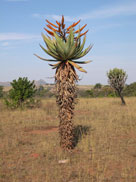|
|
 |
 |
|
Biodiversity Capacity Building Needs Assessment

Background and Themes
The Capacity Building Needs Assessment (BCBNA) Project formally started on 1st July 2002 and its purpose is to assess the current situation with respect to institutional capabilities to implement the recently completed NBSAP for Swaziland.
Four themes have been selected for the BCBNA, based on priorities set by the Global Environment Facility (GEF), as well as decisions of the Conference of Parties of the Convention on Biological Diversity (CBD). The themes are:
- in situ and ex situ conservation and sustainable use;
- initial assessment and monitoring programmes including taxonomy;
- design and approaches relevant to incentive measures and
- conservation and sustainable use of biodiversity important to agriculture.
The Project
The BCBNA Project is funded by the GEF and implemented by the United Nations Development Programme (UNDP). The Swaziland Environment Authority is the Executing Agency, responsible for the overall management and administration of the project. The BCBNA Project will take twelve months running from 1st July 2002 to 31st June 2003.
Cheap Swiss omega fake watches UK with best movements are suited for men and women.
2024 UK rolex replica perfect replica cartier watches with high quality on sale.
1:1 best replica watches UK in discount from online store. Fast shipping. Money back guaranty.
The outputs of the BCBNA are:
- To formulate a Capacity Development Plan and financing proposal for addressing it.
- Setting national priorities for implementation of the NBSAP.
- To provide a framework for monitoring and reviewing biodiversity management in Swaziland
- Establish the basis for future needs assessments.
Objectives
The broad objective of the project is to assess the capacity building needs for implementing the National Biodiversity strategy and Action Plan and to define country specific priorities on biodiversity management in Swaziland.
Specific objectives of the BCBNA Project are:
- To get a clear picture of the current situation regarding capacity building needs in Swaziland, using the year 2002/2003 as a benchmark.
- To reveal particular gaps to focus on
- To compile an inventory of biological resources (human and infrastructure) within the participating institutions
- To compile a national inventory of biological expertise found within Swaziland
The Work
The SEA has contracted a full time Coordinator and an organizational structure for the BCBNA project has been developed. In executing the project work plan, the Project Coordinator reports to the CBD / GEF Focal Point for Swaziland and will rely on a Steering Committee (the Biodiversity Programmes Implementation Committee) for technical advice.
Consultants will be contracted to carry-out capacity building needs for the four themes specific tasks and compile reports for these tasks. The needs assessment assignment will consider human resources, infrastructure and other needs using a combination of workshops, SWOT analysis of institutions, consultancies and questionnaires. Awareness raising will be achieved through leaflets disbursing, publishing articles through the media and posting project information on the internet.

Outputs
Anticipated outputs of the BCBNA project include:
- A full national report on BCBNA for approval by cabinet; to be used in seeking of donor and local support to implement the capacity development.
- Sub-theme reports on capacity building needs.
- A Capacity Development Plan.
- A relevant framework for domestic action in addressing capacity building needs in Swaziland
- Budgetary implications of implementing report
- Inventory of experts working on biodiversity management in Swaziland (for selected themes)
Participating Institutions
The institutions to be assessed are:
MTEC; SEA; SNTC / NEEPMOAC; Forestry & Livestock Departments; NTSC; NPGRC; Fisheries; Livestock UNISWA Biology & Crop Departments; PRIVATEparks including Big Game Parks , Mhlosinga, Mbuluzi, Simunye, Phophonyane, Muti Muti, Shewula, Sibhetsumoya, Oberland, Hawane, Nisela and Shonalanga; NGOs such as Yonge Nawe, SD. Farmer Development Foundation, Women Resource Centre and Traditional Healers associations, Communities
Who to contact about the Project?
- The Project Coordinator (Mr. Titus Dlamini)
- The Technical Committee Chairman (Mr. Freddy Magagula)
- Swaziland Environment Authority (Mr. Steven Zuke)
The National Biodiversity Strategy and Action Plan NBSAP describes the issues in more detail.
Related documents:
Swaziland National Biodiversity Strategy and Action Plan
|
|
 |
|
 |
|
 |
 |
Responsible Organisation:
SEA
|
|
 |
|
 |
|